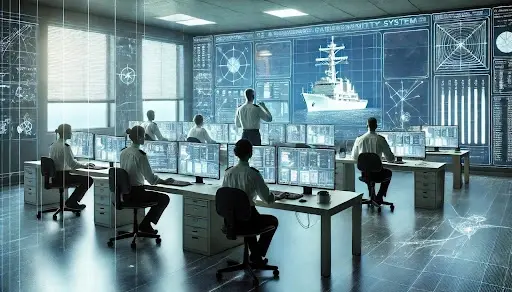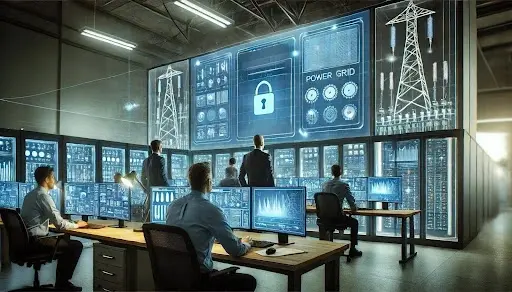What Maritime, Energy, and Healthcare Industries Can Teach Each Other About Cybersecurity
- Alex Yetushenko

- Jul 13, 2025
- 5 min read
Maritime Energy and Healthcare cybersecurity: Cybersecurity Lessons Across Critical Industries
The Maritime, Energy, and Healthcare industries are the backbone of global infrastructure, ensuring the smooth operation of supply chains, energy distribution, and patient care. However, as these industries become increasingly digitalized, they also become prime targets for cyberattacks.
Each of these industries has unique cybersecurity challenges, but they also have valuable lessons to offer one another. By sharing strategies, experiences, and best practices, these sectors can strengthen their defenses and create a more resilient global cybersecurity ecosystem.
This article explores what the maritime, energy, and healthcare industries can teach each other and how Salvador Technologies' 30-second recovery solution ensures operational continuity across all three sectors.
Learn why Maritime Energy and Healthcare cybersecurity are a vital issue.
Cybersecurity Challenges and Best Practices in Three Critical Industries
Maritime Industry: The Floating Cyber Battleground
The Growing Cyber Threat to Maritime Operations
The maritime sector has embraced digital transformation, integrating automated navigation systems, cargo management platforms, and interconnected communication networks. While this has improved efficiency, it has also made vessels and port operations highly susceptible to cyberattacks.

Common cyber threats in the maritime industry include:
GPS Spoofing & Navigation Manipulation: Hackers can alter GPS signals, leading vessels off-course or into dangerous waters.
Ransomware in Port Operations: Attackers lock down entire port management systems, delaying global supply chains.
AIS (Automatic Identification System) Exploits: Manipulation of AIS data can hide or falsify ship locations, creating smuggling risks.
Nevertheless, Recent studies reveal that a significant portion of maritime professionals believe the industry should accept increased cyber risk from digitalization to foster innovation and new technologies
Best Practices From Maritime Cybersecurity
Despite these threats, the maritime industry is pioneering innovative approaches to cyber resilience. These include:
Strict Cyber Risk Management Frameworks: Ship operators proactively assess cybersecurity risks before implementing new technologies.
Redundant Communication Systems: Ensuring that backup navigation and communication tools are in place in case of cyber failures.
Regular Cybersecurity Drills: Ports and shipping companies train their staff to detect and respond to cyber incidents.
How Salvador Technologies Secures Maritime Operations
Air-Gapped, Immutable Backups: Salvador’s Cyber Recovery Unit (CRU) isolates critical backup data, ensuring that even if hackers compromise the main system, a clean backup is instantly available.
30-Second Recovery for Port & Ship Operations: If a cyberattack disrupts cargo management or navigation systems, Salvador’s solution enables a full system restoration in seconds, avoiding costly delays.
Enhanced ICS/OT Protection: Salvador secures automated ship controls and port machinery, preventing cyber intrusions from disrupting essential maritime operations.

Energy Sector: Cybersecurity Challenges in Power & Fuel Supply
Why the Energy Industry is a Prime Target for Cybercriminals
The energy sector powers everything from homes to hospitals, and cybercriminals know that disrupting energy supply chains can create widespread chaos. State-sponsored attacks, ransomware, and supply chain exploits pose severe risks.
Common cyber threats in the energy sector include:
Power Grid Manipulation: Hackers can cause mass blackouts by exploiting vulnerabilities in smart grids.
Pipeline Ransomware Attacks: Like the Colonial Pipeline attack, cybercriminals freeze fuel distribution and demand ransom.
SCADA System Vulnerabilities: Many supervisory control and data acquisition (SCADA) systems in power plants still run on outdated software, making them easy targets.
Best Practices From Energy Cybersecurity
To combat these threats, energy companies have adopted strict security frameworks that other industries can learn from:
Segmented Networks for Critical Systems: Separating administrative IT networks from operational OT systems limits the damage of cyber intrusions.
AI-Driven Threat Detection: AI-based monitoring tools help identify anomalies in power grid operations before they escalate.
Regulatory Compliance & Standards: Energy firms follow strict NIST and IEC 62443 regulations, ensuring strong security measures.
How Salvador Technologies Enhances Energy Sector Security
Instant Recovery for Power Plants & Pipelines: If malware shuts down a power grid or fuel pipeline, Salvador’s 30-second rollback restores operations immediately, preventing economic damage.
Air-Gapped Backups for SCADA Systems: Unlike cloud-based solutions, Salvador’s secure, hardware-based recovery prevents unauthorized remote access.
Resilient Cyber Recovery for Smart Grids: Salvador ensures that power grids can recover from cyber threats without prolonged outages.

Healthcare Sector: Cybersecurity and Patient Safety
Why Healthcare Cybersecurity is More Critical Than Ever
Cyberattacks on healthcare providers have surged in recent years, affecting hospitals, medical devices, and patient data storage systems. Patient safety is directly at risk when a cyberattack compromises critical medical infrastructure.
Key threats in healthcare cybersecurity include:
Ransomware Locking Electronic Health Records (EHRs): Hospitals lose access to patient data, delaying urgent treatments.
Hacked Medical Devices: Pacemakers, insulin pumps, and MRI scanners are vulnerable to remote takeovers, endangering lives.
DDoS Attacks on Hospital Networks: Overloading healthcare IT systems causes major service disruptions.
Important to note, that in response to a challenging year of cyberattacks on healthcare providers, U.S. regulators and lawmakers are proposing new cybersecurity rules for 2025 to protect hospitals.
Best Practices From Healthcare Cybersecurity
Because patient safety is on the line, the healthcare industry enforces some of the strictest cybersecurity protocols:
Zero Trust Security Models: Hospitals limit access to systems using multi-factor authentication (MFA) and strict privilege controls.
Network Segmentation for Medical Devices: Isolating life-saving equipment from public hospital networks minimizes cyber risks.
Compliance With HIPAA & GDPR: Ensuring patient data security regulations are met prevents legal liabilities.
How Salvador Technologies Strengthens Healthcare Cybersecurity
Instant Recovery From Ransomware: Salvador’s 30-second rollback restores medical records and critical hospital systems, preventing disruptions in patient care.
Air-Gapped Protection for Life-Saving Equipment: Salvador secures MRI scanners, ventilators, and infusion pumps, ensuring they remain operational even during cyber incidents.
Regulatory Compliance for Healthcare IT: Salvador’s solutions meet strict healthcare cybersecurity regulations, protecting patient data.
What These Industries Can Teach Each Other About Cybersecurity
Each industry excels in certain cybersecurity areas, but they can also learn from one another:
Maritime can adopt Energy & Healthcare’s Regulatory Standards: The maritime sector is still developing cybersecurity regulations—it can benefit from the strict compliance standards in energy and healthcare.
Energy Can Learn From Maritime’s Risk-Acceptance Culture: The energy sector is hesitant to embrace new technology due to security concerns, but it can learn from maritime's approach to balancing cybersecurity with innovation.
Healthcare Can Implement Energy’s AI-Driven Cyber Monitoring: The energy sector uses AI to detect cyber threats in real-time—healthcare can apply similar monitoring solutions to protect hospitals and patient data.
By combining expertise, these industries can strengthen their defenses against evolving cyber threats.
Salvador Technologies: The Ultimate Cyber Recovery Solution
With cyberattacks becoming more sophisticated, the key to resilience is rapid recovery. Salvador Technologies' 30-second cyber recovery is the ultimate failsafe, ensuring that even if cyber defenses are breached, operations can resume immediately.
Why Salvador Technologies?
✅ Air-Gapped Cyber Recovery – Ensures 100% protection from ransomware.
✅ 30-Second Full System Restoration – Eliminates downtime and financial losses.
✅ Compatible With ICS/OT Environments – Designed for maritime, energy, and healthcare systems.
Take Action Today
💡 Don’t let cyber threats disrupt your industry. Protect your operations with Salvador Technologies' rapid recovery solutions.
📩 Contact us today for a demo.





Comments